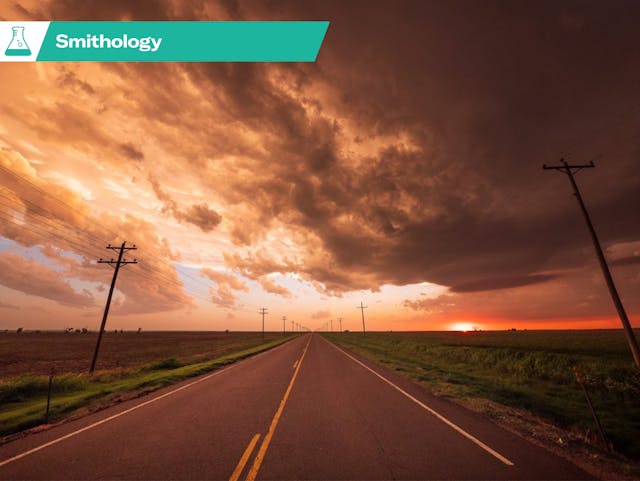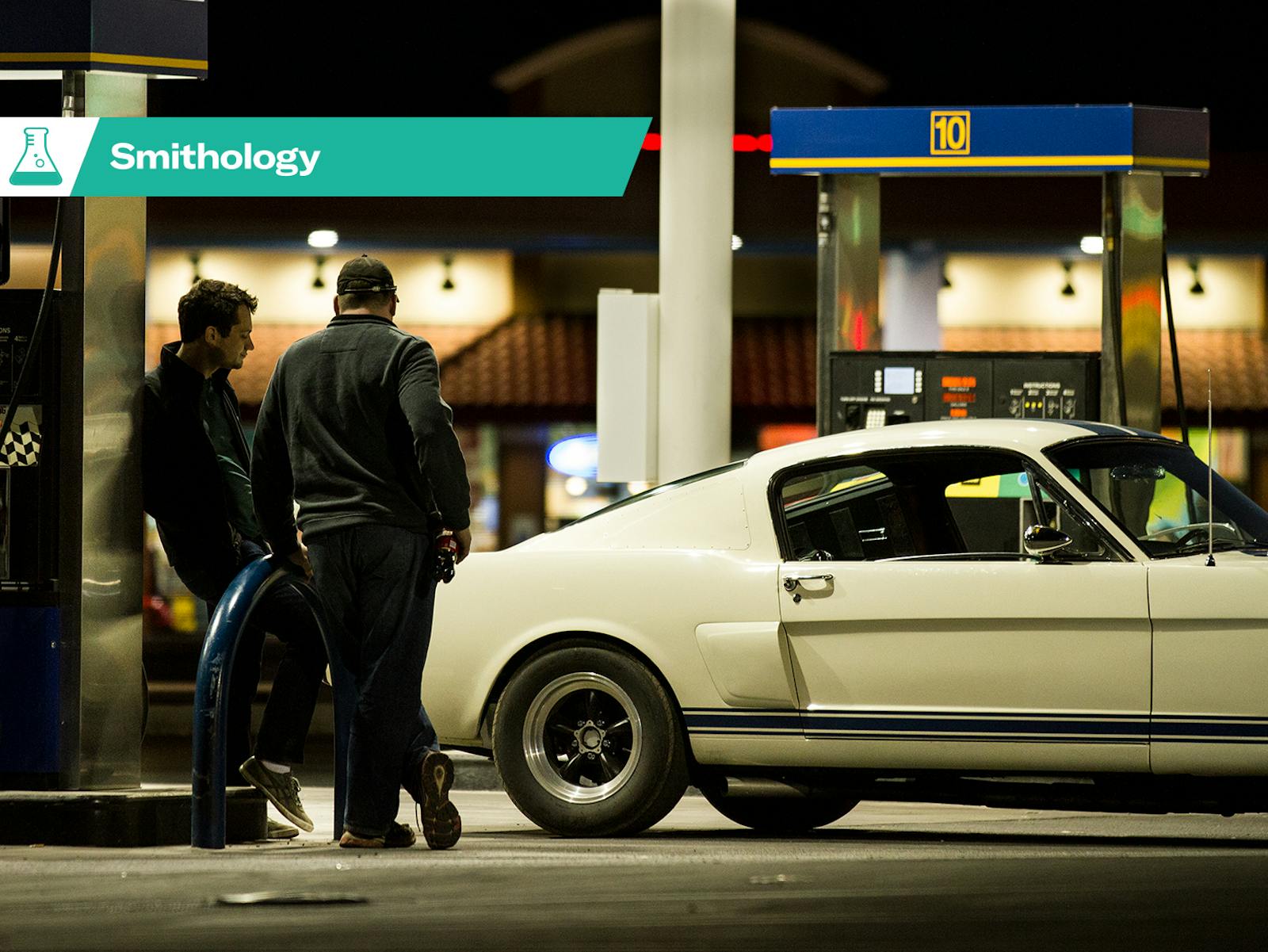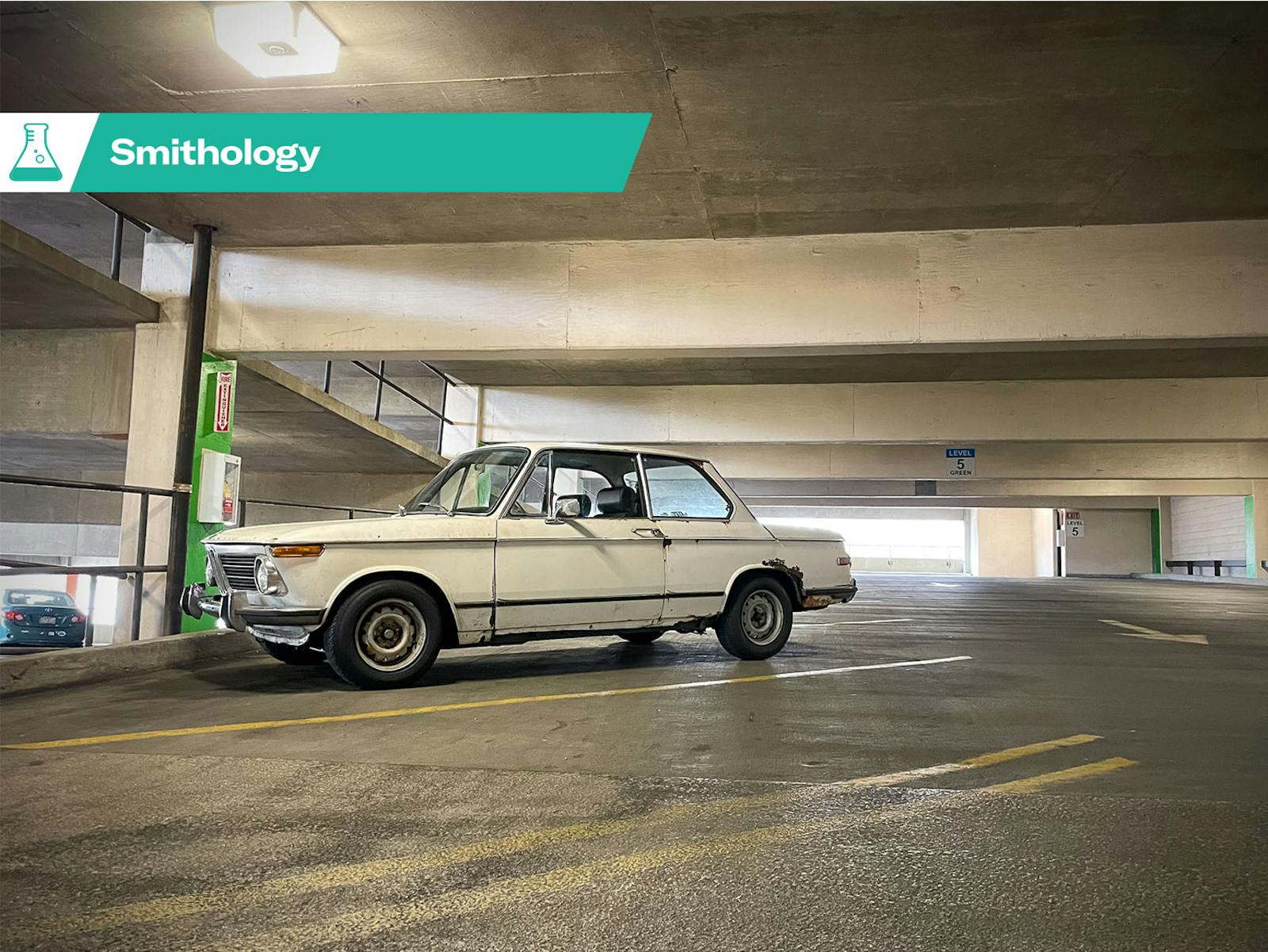Smithology: Always thought that was the engine you wanted, with a Mustang

The road ran to the horizon, as Kansas roads often do. No stoplights, just a blanket of farms, corn and sorghum waving in the wind. The air smelled of manure and wildflowers and the sticky sweetness of a late June evening, that unmistakable combination of season and place, when the gloaming is so long and dense that it settles onto land like syrup, thick enough to eat.
Chaffee had called a month or two before. He was moving east from California, he said, and his old motorcycles were going with. I had no good reason to ride two aging European bikes from San Francisco to Tennessee with an old friend, so that’s what I did. Mostly on rural two-lanes, doing 80 mph whenever possible and treating corners like games but also taking long breaks to sit under trees and suck down bottles of water.
I had never seen a Kansas yard sale. Certainly not on Highway 50, and by that point, we had been conveyor-belting down it for a day already. Fifty bee-lines across the state’s southern third, pin-straight, changing heading or elevation once a county at most. The scenery is variable but not varied, mostly threshers and silos. On a motorcycle, alone in your helmet, time dilates. Fugue states blow in like weather, wipe any memory of breakfast that morning or what you did five minutes ago.
And so I found myself with the bike stopped, on a section of highway that sloped down into a shallow valley of still air, walking toward a house. White clapboard with a gable roof, next to a weathered pole barn and a stand of maples. There were no signs, nothing to advertise a sale, just a short driveway with a few tables and an older man in a folding chair.
Chaffee downshifted to a stop at the end of the driveway. He hung his helmet on a mirror but stayed on the bike, lighting a cigarette and waving me on in disinterest. A few feet away, under a carport, a chocolate lab raised his head from the concrete, half asleep, then laid it back down, as if he had read all the books where country dogs do that sort of thing and didn’t want to disappoint.
The man at the table looked late sixties, or maybe far older, in that fuzzy way farm country can age people. Loose jeans and a plaid shirt. The tables held random household bits. VHS tapes, a few collectible drinking glasses, a dusty blender that could have known Eisenhower.

He smiled. “Hello.”
“Hi. All this for sale?”
A chuckle. “Either that or my wife is going to be real unhappy I gave it away for no money.”
“Mind if I look around?”
“Sure. Nice motorcycle. Seventies?”
“Yes, sir. Friend’s.” I gestured to the road. “Just helping move it.”
“Where you headed?”
“Tennessee.”
“Long way.”
“Been fun, though.”
“Bet it is.”
The dog did the head thing again. I chalked my strange mood up to long miles in the saddle. The next few minutes were spent in that universal yard-sale sketch, where you quietly poke through someone’s cast-offs as they watch, each of you pretending to not be drawing conclusions about the other. A milk crate held a small collection of crooner records, half of them duplicates. Several books on photography sat atop a short stack of fashion magazines, covers faded thin from hours in the sun.
I leafed through the top photo book, then set it back down. The stack shifted a little, and a flash of blue peeked out from the bottom. More washed ink, a sliver of familiar font, letters once yellow but now almost white. I carefully lifted the magazines and slid the blue cover out from underneath.
“An old Haynes manual? For Weber carburetors?”
The man cocked his head. “You like old cars?”
“All my life. You own something with Webers?”
“A street rod with a small-block and IDFs, long time ago. Never ran right. Book helped, though. Idle circuit does more than you think.”
“Right. Have a DCOE on a bookshelf at home, as reminder. Or maybe reason to forget.”
Another chuckle. “They make good noise.”
I flipped through the Haynes. The vintage jet tables in the back had been crossed out with thick black marker. Figures. Modern fuels are more oxygenated.
The wind picked up, ruffling the magazines on the table.
“You in a hurry to get back on the road? Got some stuff in the barn, might be up your alley. Cars, parts. Some pretty good, just need a new home.”
I looked back at the highway. Chaffee was lighting a second cigarette.
“Got some time,” I shrugged. “And re-homing is my… weak point.”
“I know the feeling.”
He stood up slowly, fishing into a pocket for a set of keys. They jangled as he shuffled down the drive to the barn. The door handle stuck some, needing a wiggle to release the lock. When it gave, he turned, cracking the door before walking through.
“My wife calls this my other family. Says I treat them better than her.”
The door opened to the unmistakable smell of fresh construction, new paint and treated wood but also a whiff of oil and rubber. He reached for a switch, and banks of fluorescents winked to life beneath wooden rafters. The space was simple but large, its coated concrete floors bordered by tidy drywall. The sheetrock, a warm cream, had been painted to match the house. The barn seemed larger inside than out. Two rows of cars, maybe a dozen in all, covered loosely and parked side by side, stretched to the rear wall, around a wide center aisle.
I took a few tentative steps inside. The shape closest to the door looked familiar, but I couldn’t place it. He walked over, gently pulling the cover up and onto the car’s roof.
“Aztec Gold. Originally black seats and dash, but it was converted to saddle from new, factory parts. Sat at the dealer down the road for three months before it sold, nobody wanted the color. My son spotted it driving by one day, talked about it for weeks. Bought it after a year’s work at the meatpacking plant in Garden City, then went off and enlisted, deployed, never came back. Four thousand miles. He put the Daytons on it. Always did like wire wheels.”
A late-Nineties Mustang. An SN95, shiny and straight and with that tell-tale hint of factory orange peel, never resprayed. I looked in the window: and an automatic. Taut and unwrinkled leather. A hideous package, impeccably preserved.

I didn’t know what to say, so I smiled and said what my Southern mother always said in moments of lost words.
“That’s, uh… very nice.”
He beamed. “V-6. Has the tall diff, so it’s quiet on the highway.”
“The V-6,” I repeated, slowly. Both of my eyebrows quietly made for the ceiling.
“Always thought that was the engine you wanted, with a Mustang.”
“You might say that.”
“Great shape. Tank’s drained. Probably start right up with fresh gas.” He lifted the cover from the roof and set it neatly on the trunk.
An expectant look.
“Pretty good, right?”
I fibbed. “Oh, uh, yes. Very much.”
The tour continued. Over the next short while, he proudly removed cover after cover, half the cars in the room. Seen whole, the collection carried no theme but mediocre surprise, no thread but the widely unloved. Fifteen feet away, over a small puddle of gear oil, lay an AMC Pacer. Limited trim, not even the sport pack, one more automatic in a room full of them, beige with the original wavy panels and indifferent gaps, just under 10,000 miles on the clock. A 95-point car, frozen as if in amber, exactly as Kenosha had built it. Ten feet over was a late-Eighties Camry, silver, the anemic base model, its rubber park-bench bumpers seemingly right off the showroom floor. We walked by three identical covered blobs that looked suspiciously like early Ford Tempos. The slumping form of a Nineties Chrysler Sebring. A Gremlin was parked in the back, almost an afterthought, an impeccable period respray in flake bronze, just as perfect as the rest. Filigreed pinstripes on the flanks.
I was left with the strange feeling of having stumbled into someone else’s dream.
“How did all this stuff find you?”
“I went looking for it.”
“Really?”
“Well, mostly. After a fashion.”
We talked as we walked the room. He inquired on our trip, where we’d been and what we’d seen. Then I asked more on the fleet, and the stories came out. Every car in the barn had been carefully chosen, and nothing was there by accident. Each machine had a story, a reason why the original owner had walked into some dealer somewhere and driven off in that particular make and model. The first check a cancer survivor wrote after her doctor declared remission. The first person in a small-town family to go to college, who then bought his mother her first new car. The new convertible a janitor drove home after investing wisely and earning enough to buy the company. Each story ended with the change in circumstance that had prompted a sale. A death, a birth, old age; never a want, always a need.
All of this was logged. He showed me the journal in each trunk, a mix of hand-written notes and receipts and copies of photos, gifted or scanned or recorded at time of purchase. A library of human experience, how one unique person came to love one car for reasons beyond the machine, then moved on.
The chat was uplifting, but after a while, I sensed the old man was working toward something.
He looked at the ground for a moment. “You know,” he said softly, “I could make you a deal. It all runs. Have a container of spare parts behind the house. I can’t be caretaker any more, but it all needs looking after. By someone who cares about history and stories. I’d take whatever you could pay.”
The building suddenly felt hollow. I put my hands in my pockets and bit a lip.
What came out next was truth, polite as I could manage. “I’m sorry,” I said, haltingly. “The stories are worth saving, and what you’ve done here is wonderful, but I think you’ve got the wrong impression. I don’t have a lot of money or space to begin with, but more than that, these just … aren’t for me.”
His face fell. Then he smiled, a little warmer, moving toward the Gremlin, where he slowly began to replace the cover. I fumbled for a consolation.
“I wish I were the one here. I’m just not. I can’t be.”
When he finally looked back, he seemed distracted.
“No harm, I suppose. I understand.”
“I’m sorry. I really am.”
He paused, thoughtful. “You have one more minute? Maybe I could show you the back room?”
It was getting late. My mind ran through ways to beg off, then caved.
“Alright. But then we really have to get back on the road. Cross off another few counties before bed. You know how it is.”
“I do.” Another warm smile.
He walked to the building’s back wall, moving quicker than before. A thick metal panel hung there loosely from a narrow rail, castered to slide open. For whatever reason, I hadn’t noticed it when we walked in, would have sworn it wasn’t there. He opened a padlock on the latch.

“Everything in here isn’t really for me, but I haven’t been able to pull the trigger and get rid of it. Just not the selling type, I guess. Give me a hand? Door’s heavy.”
The steel groaned as we leaned on the handle, but it moved. The room behind was small and densely packed, a tidy mirror of the one in front, lit off the same switch, just with the cars closer together, mirrors inches apart. More covers, but the lines here, I knew better: an Acura Integra, a boxy Lancia Delta, a Fox Mustang’s argument of creases. In the back, however, crouched behind the rest, lived something smaller and more curving.
After a moment, he walked over and pulled that cover. My throat went dry.
A knowing look. “Figured this would push your button. Only a few people know it’s here.”
“I mean … It looks … is it real?”
“Probably needs everything, but it’s all real. Even has a few rare accessories. Hasn’t run in years. Bought it for $5000 in the early Seventies. Lot of money, but we had inherited some, and I’d always wanted one. Turns out I don’t like it, probably the only person on earth to say so. Don’t fit. Friend gave me a ride once. Fastest car I’ve ever been in. And it sure is pretty.”
Whoever looked at a real Sixties Shelby Cobra and didn’t go weak in the knees? An unrestored 289, leaf springs, a slabside, early and pure, before they put that 427 under the hood with a whip and a chair. The odometer showed miles, but far less than enough to wear the thing out. The paint was flat and oxidized, and the plating had dulled, but the rest was as it left Phil Remington and Carroll. That tiny shop in Marina del Rey.
I knelt next to a fender, watching light pool on thin lacquer. English roadster by way of a bunch of hot-rodders on the west coast.
These cars were never cheap, even 50 years ago. But what’s a survivor 289 now? A million dollars?
My host sighed. “I know what it’s worth. But if I’m honest, I don’t need the money. We’ve got enough, and the other cars can go to charity when I’m gone. Would rather this one just find somebody who loves it but can’t afford it, might give it what it needs.”
I wrung my hands a little, then knelt next to the grille. Every slat in the egg crate was flat and straight. “Sir, I can’t imagine it needs much. Even in this shape. I love it. But I can’t be your man. Even that steering wheel is worth more than I’ve got.”
“I don’t think you understand.”
“I’m not sure I…”
“There’s no deal here. Made my mind up a while back. You took time to listen to the stories about all that stuff out front. Didn’t laugh. Didn’t ask if I’m crazy. Couple people have made offers for the lot, but nobody treats it with dignity, and that’s worth something. Not a lot of people remember to be kind any more.”
My face felt numb. He bent over the cockpit, retrieved an official-looking slip of paper from the glovebox.
“Hell with it,” he said, holding the paper out. “Yours now. Glad to find a good home.”
I gaped, hesitant for a moment, then willed myself to reach. My hand went out, unsteady.
A familiar voice echoed from behind.
“You ready? There’s a storm on the way. We should get moving.”
I turned, startled.
Chaffee was standing in the doorway. The room was now much darker. The wide dirt floor held nothing but scraps of lumber and a few crushed beer cans, and that big metal door was off its hinges, quietly rusting up against a wall. A small gash in the roof, left long ago by some fallen tree, let in the only light. No one but Chaffee and I had been there in years.
“Everything okay? You look a little weird.”
A blink or two. My head began to clear. In the distance, a truck went by.
“Sorry. Got distracted. Been a long day.”
“We probably have a few minutes, if you want to poke around a bit more.”
I glanced around the barn. “Nah, that’s alright. We should get going. No reason to get stuck in weather.”
We walked outside, boots crunching over gravel. There was no yard sale, no tables, and weeds filled the drive. The handmade plastic sign nailed to the front door was cracked and dulled with age, but its yellow letters still wore enough paint to spell out FOR SALE BY OWNER. A weathered dog dish sat under the carport, full of old rain.
The bikes waited patiently on the shoulder. I put on my gear, taking only a bit longer than usual, fussing with the helmet strap. As I went to hit the starter, Chaffee leaned over, his bike already running, flipping up his visor.
“Just seemed like an old pole barn—I miss something?”
I shook my head. “Nah. Not really.”
We pulled back onto the highway, eastbound, away from the rain. More towns slipped by in the dark. Houses hunched near the road, passing in shadow, and while many were empty, most were not. I rode on, feeling lucky, and thought mostly of dreams in the night.
***
(Editor’s note: I like fiction. Like fiction about cars. I’m inclined to let Sam write some more of it. Might invite a few others to the party. If you have thoughts about this, of an encouraging nature or otherwise, let’s hear them in the comments. –Jack Baruth)

